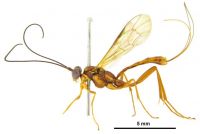ICHNEUMONIDAE: : Liotryphon Ashmead 1900
Diagnosis:
Characteristics of Liotryphon include: 1. Body size ~10mm; 2. Position of spiracle on T1 at, close to, or before centre; 3. Shape of aerolet in forewing is triangulate; 4. Colour of face is only black; 5. Metasoma compressed dorsal-ventrally; 6. Size of ocelli are small; 7. Length of antennae shorter than body; 8. Length of ovipositor is as long, or longer than body; 9. Wings present; 10. Colour of wings hyaline (clear); 11. Sternaulus absent; 12. Shape of face in lateral view flat or only weakly bulging; 14. Shape of T1 (viewed laterally) is evenly curved; 15. Number of teeth in mandibles 2 [blunt]; 16. Metasoma with stripes; 17. Length T1 less than T2, T1 is short, squat; 18. Sculpture on mesoscutum is finely pitted, many hairs; 19. Width of T1 (viewed dorsally) of uniform width slightly widening posteriorly; 20. Glymma is a deep pit; 21. Sculpture on metasoma is punctured; 22. Propodeum very short (not reaching beyond coxal insertion).Similarity to Other Taxa
Liotryphon is a mid-sized Ichneumonid in New Zealand. It siimilar in size to: Dusona , Liotryphron , Lissonota , Phytodietus and Venturia . It can be separated from other taxa by having the spiracle at or before the centre of T1, a glymma on T1, the ovipositor length long, triangulate areolet in the forewing, and T1 is squat.Compare
-

Lissonota
Glymma present as groove (not deep). -

Phytodietus
Ovipositor length distinct but not longer than the body, a petiolate areolet in the forewing. -

Dusona
Metasoma black colouration; (compared to brown tergites each with a black stripe, and metaosma heavily punctured in Liotryphon). -

Habronyx
No areolet in forewing, spiracle on T1 well behind the centre of T1. -

Venturia
The ovipositor length distinct but not longer than the body, metasoma bicoloured (orange/black), spiracle on T1 well behind the centre of T1.
Distribution in NZ
North Island: AK, HB.
Species in NZ
One introduced biological control agent Liotryphon caudatus (Ratzeburg 1848).Biology & hosts
This species was introduced into New Zealand in the early and mid 1900s to control the oriental fruit moth, Grapholita molesta (Lepidoptera: Tortricidae) and the codling moth, Cydia pomonella (Lepidoptera: Tortricidae). It is considered to have very little impact on both pests (Cameron et al. 1989), and is very uncommon. In New Zealand it has also been recorded from a species of Stathmopoda (Lepidoptera: Stathmopodidae) (Cameron et al. 1989). Overseas, Liotryphon caudatus has also been recorded from Biston betularia (Geometridae) and Cydia funebrana (Tortricidae) (Yu et al. 2005).Sources of information
Cameron PJ, Hill RL, Bain J & Thomas WP. 1989. A Review of Biological Control of Invertebrate Pests and Weeds in New Zealand 1874-1987. Technical Communication No 10. CAB International Institute of Biological Control. DSIR Entomology Division. 424 p.Valentine EW & Walker AK. 1991. Annotated Catalogue of New Zealand Hymenoptera. DSIR Plant Protection Report 4. General Printing Services, 84 p.
Yu DS, van Achterburg K, Horstmann K. 2005. World Ichneumonoidea 2004. Taxonomy, Biology, Morphology and Distribution. CD/DVD. Taxapad. Vancouver, Canada.
Citation
Ward DF & Schnitzler FR. 2013. Ichneumonidae of New Zealand. Genus Liotryphon http://ichneumonidae.landcareresearch.co.nzAccessed: 14 March 2025


